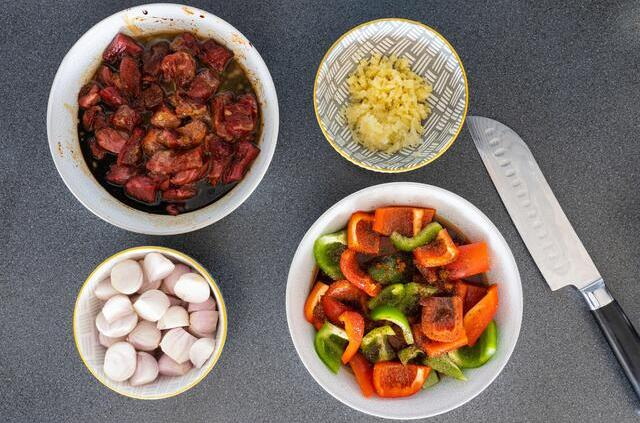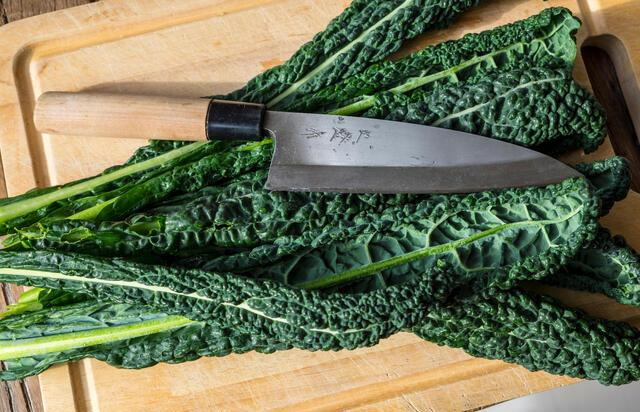

Views: 8000 Author: sales@insightknife.com.cn Publish Time: 2025-02-06 Origin: Site








Content Menu
● Understanding Knife Sharpness
>> The Importance of Sharp Knives
>> Signs That Your Knife Needs Sharpening
● How Often Should You Sharpen Your Knives?
>> General Guidelines for Sharpening Frequency
>> Factors Influencing Sharpening Frequency
● How Often Should Kitchen Shears Be Sharpened?
>> Understanding Kitchen Shears
>> Recommended Sharpening Frequency for Shears
>> Signs That Shears Need Sharpening
● Methods for Sharpening Knives and Shears
>> Manual Sharpening Techniques
>> Professional Sharpening Services
>> Using the Right Cutting Techniques
● Frequently Asked Questions regarding Knife Sharpener
>> 1. How can I tell if my knife is sharp enough?
>> 2. What is the difference between sharpening and honing?
>> 3. Can I use a whetstone for all types of knives?
>> 4. How should I clean my knives after use?
>> 5. Is it necessary to sharpen kitchen shears?
Maintaining the sharpness of kitchen knives and shears is essential for efficient cooking and food preparation. A sharp knife not only makes cutting easier but also enhances safety in the kitchen. This article will explore the importance of knife sharpening, how often kitchen shears and knives should be sharpened, and the various methods available for sharpening. By understanding these aspects, you can ensure that your kitchen tools are always ready for use, making your cooking experience more enjoyable and effective.
Sharp knives are crucial in the kitchen for several reasons. They allow for precise cuts, which can enhance the presentation of dishes. For instance, when slicing vegetables or fruits, a sharp knife can create clean, uniform pieces that not only look appealing but also cook evenly. Additionally, a sharp knife requires less force to cut through food, reducing the risk of slipping and causing injury. Dull knives can lead to accidents as they may slip off the food instead of cutting through it, potentially resulting in serious cuts. Moreover, using a sharp knife can improve the overall quality of your cooking, as it allows for better control and technique, leading to more flavorful and visually appealing dishes.
Recognizing when a knife needs sharpening is vital for maintaining its effectiveness. Common signs include difficulty in cutting through food, the need to apply excessive force, and visible nicks or damage on the blade. If you find yourself using a sawing motion rather than a clean cut, it’s time to sharpen your knife. Additionally, if you notice that the knife is tearing rather than slicing through ingredients, this is another clear indication that it has lost its edge. Regularly checking the sharpness of your knives can help you stay ahead of maintenance, ensuring that you always have the right tool for the job.

The frequency of sharpening kitchen knives can vary based on several factors, including the type of knife, how often it is used, and the materials being cut. Generally, it is recommended to sharpen your knives every few months for regular home cooks. However, professional chefs or those who cook daily may need to sharpen their knives more frequently, possibly every few weeks. This is particularly true for knives that are used for heavy-duty tasks, such as chopping through tough meats or fibrous vegetables. By establishing a regular sharpening schedule, you can ensure that your knives remain in optimal condition, ready for any culinary challenge.
Type of Knife: Different knives have different sharpening needs. For instance, a chef's knife may require sharpening more often than a paring knife due to its frequent use in various cutting tasks. Specialty knives, such as serrated knives, may also have unique requirements, as they cannot be sharpened in the same way as straight-edged knives.
Frequency of Use: The more often you use a knife, the more frequently it will need sharpening. Daily use can dull a knife quickly, while occasional use may allow for longer intervals between sharpenings. Keeping track of your knife usage can help you determine the best sharpening schedule for your kitchen.
Cutting Surface: The type of cutting board you use can also affect knife sharpness. Hard surfaces like glass or stone can dull knives faster than softer wood or plastic boards. Investing in a high-quality cutting board can help preserve the edges of your knives and extend the time between sharpenings.
Food Type: Cutting through tough materials, such as bones or hard vegetables, can wear down the blade more quickly than slicing through softer foods. Being mindful of the types of ingredients you are working with can help you gauge how often your knives need sharpening.

Kitchen shears are versatile tools used for various tasks, from cutting herbs to snipping kitchen twine. They are often overlooked in terms of maintenance, but like knives, they also require regular upkeep to ensure they function effectively. Kitchen shears can be used for a wide range of tasks, including opening packages, cutting through poultry, and even slicing pizza. Their multifunctionality makes them an essential tool in any kitchen, and keeping them sharp is crucial for their performance.
Kitchen shears should be sharpened less frequently than knives, typically every six months to a year, depending on usage. If you use them daily or for heavy-duty tasks, consider sharpening them every few months. Regularly checking the sharpness of your shears can help you maintain their effectiveness and prolong their lifespan. Additionally, some shears come with a built-in sharpening mechanism, which can make maintenance easier and more convenient.
Similar to knives, signs that kitchen shears need sharpening include difficulty cutting through food, the blades feeling rough, or the shears not closing properly. If you notice these issues, it’s time to sharpen your shears. A well-maintained pair of kitchen shears should glide through ingredients effortlessly, making food preparation quicker and more efficient. If you find yourself struggling to cut through even soft herbs, it’s a clear indication that your shears need attention.
Whetstone: A whetstone is a traditional method for sharpening knives. It requires some skill but can produce a very sharp edge. To use a whetstone, wet the stone, hold the knife at a 20-degree angle, and slide the blade across the stone in a sweeping motion. This method allows for precise control over the sharpening process, enabling you to achieve the desired sharpness. It is also a cost-effective option, as a good whetstone can last for years with proper care.
Honing Rod: A honing rod is used to realign the edge of the knife rather than sharpen it. Regular honing can extend the time between sharpenings. It is recommended to hone your knives before each use. This simple practice can help maintain the blade's edge and improve cutting performance. Using a honing rod is quick and easy, making it an essential part of your knife maintenance routine.
Electric knife sharpeners are convenient and can quickly sharpen knives with minimal effort. They typically have built-in guides to help maintain the correct angle. However, they may remove more material from the blade than manual methods, so they should be used sparingly. While electric sharpeners can be a great option for those who prefer a quick solution, it is essential to follow the manufacturer's instructions to avoid damaging the knife.
For those who prefer not to sharpen their knives at home, professional sharpening services are available. These services can provide a high level of sharpening and are often recommended for high-quality knives. Professional sharpeners have the experience and tools necessary to restore your knives to their original sharpness, making it a worthwhile investment for serious cooks. Additionally, many professional services offer maintenance tips to help you keep your knives in top condition between sharpenings.

Storing knives properly can help maintain their sharpness. Use a knife block, magnetic strip, or blade guards to protect the edges from damage. Avoid storing knives loose in a drawer, as this can lead to dulling and nicks. Proper storage not only preserves the sharpness of your knives but also enhances safety in the kitchen by preventing accidental cuts. Investing in a quality knife storage solution can pay off in the long run by extending the life of your knives.
In addition to sharpening, regular maintenance is essential. Clean knives after each use and dry them immediately to prevent rust. Avoid putting knives in the dishwasher, as the heat and movement can damage the blades. Regularly inspecting your knives for any signs of wear or damage can help you catch issues early, allowing for timely repairs or replacements. Taking the time to care for your knives will ensure they remain reliable tools in your kitchen.
Using the correct cutting techniques can also prolong the sharpness of your knives. Avoid using knives on hard surfaces and instead opt for cutting boards made of wood or plastic. Additionally, use the knife for its intended purpose; for example, do not use a chef's knife to pry open cans. Being mindful of how you use your knives can significantly impact their longevity and performance. Developing good cutting habits will not only keep your knives sharper for longer but also improve your overall cooking skills.
Maintaining the sharpness of kitchen knives and shears is crucial for safety and efficiency in the kitchen. Understanding how often to sharpen these tools, recognizing the signs of dullness, and employing the right sharpening methods can enhance your cooking experience. By following these guidelines, you can ensure that your kitchen tools remain in optimal condition, making food preparation a more enjoyable task. Investing time in the care and maintenance of your knives and shears will pay off in the form of improved performance, safety, and overall satisfaction in your culinary endeavors.
You can test the sharpness of your knife by performing a simple paper test. Hold a piece of paper vertically and try to slice through it with the knife. If the knife cuts through easily without tearing, it is sharp. If it struggles or tears the paper, it needs sharpening.
Sharpening involves removing material from the blade to create a new edge, while honing realigns the existing edge without removing material. Honing should be done regularly to maintain sharpness, while sharpening is needed when the knife becomes dull.
Yes, a whetstone can be used for most types of knives, including stainless steel, carbon steel, and ceramic blades. However, the technique and angle may vary slightly depending on the knife type, so it's essential to follow the manufacturer's recommendations.
After using your knives, wash them by hand with warm, soapy water and a soft sponge. Avoid using abrasive cleaners or putting them in the dishwasher, as this can damage the blade and handle. Dry them immediately to prevent rust.
Yes, kitchen shears also need to be sharpened regularly to maintain their cutting efficiency. If you notice that they are struggling to cut through food or feel rough when cutting, it’s time to sharpen them. Regular maintenance will ensure they remain effective for various kitchen tasks.